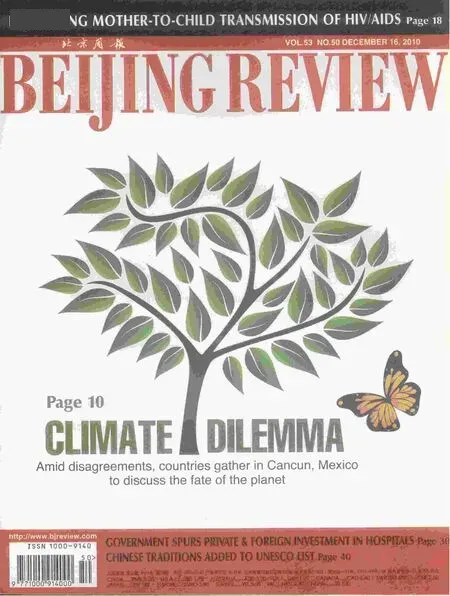A Greener Future
2010-10-14AbdullahAl-Saidi,SergioSerra,AlfWills等
A Greener Future
In the past year, extreme weather events have erupted across the globe, and 2010 looks to be one of the hottest years in recorded history. That has placed an onus on the Cancun conference to prompt countries into action on climate change. Of course, Cancun will not be the last chance for the world to transform words into deeds, but it is de fi nitely a crucial one.
Ambassador Abdullah Al-Saidi, Yemen’s Permanent Representative to the UN and Chairman of the Group of 77 (G77);Sergio Serra, Ambassador for Climate Change of Brazil; Alf Wills, lead climate negotiator of South Africa; and Jake Schmidt,International Climate Policy Director of the New York-based advocacy group Natural Resources Defense Council, sat down withBeijing Reviewreporter Hu Yue to share their opinions on the sidelines of the Cancun conference. Edited excerpts follow:
Beijing Review: What is your opinion on the current state of global climate negotiations?

Abdullah Al-Saidi:At such a critical stage of negotiation, we need to have an outcome under both negotiating tracks [tasked respectively to negotiate for long-term cooperative action against climate change and to discuss further commitments for the 37 industrialized countries that have ratified the Kyoto Protocol after its fi rst commitment period expires in 2012]because absence of an outcome will damage the multilateral negotiating process.The outcome should encompass a set of decisions on capacity building in developing countries and increasing the funding to adaptation, as well as technology transfer.
A crucial issue we are discussing now in Cancun is climate fi nancing provided by developed countries. There are suspicions that some of the already-committed funds may have been transferred from other aid budgets and just pasted with a climate label. Efforts are underway to build a fi nancial architecture to ensure that the funding commitments are new and to effectively monitor how the capital is spent.
We developing countries will do our part to help come up with a balanced package, but it is my view that without a concession by developed countries on the second commitment period of the Kyoto Protocol, the negotiating process would not succeed. The constructiveness of the G77 and China must be reciprocated by developed countries in extending the Kyoto Protocol.

Sergio Serra:At the Cancun conference, some countries have been quite vocal in opposing the continuation of the Kyoto Protocol. Still,most parties, including Brazil, still want a legally binding agreement on the protocol’s second commitment period. It may be dif fi cult to reach that target before 2012, so we have to weigh some other legal and technical ways to avoid the gap.
As a fast-growing developing country, Brazil has been at the forefront of the global fight for a greener world. We have vowed to cut emissions by 36-39 percent by 2020 from 2005 levels. Most importantly, our mitigation actions are not conditional upon foreign support or others showing similar ambitions. The biggest cause of Brazil’s emissions is not energy consumption, but deforestation. That is why we are fi rmly committed to lowering deforestation in the Amazon Rainforest by 80 percent by 2020.

Alf Wills:There are two major problems we are trying to address at this moment. One relates to the balance between the two negotiating tracks. At the heart of this issue is the challenge of how to reach the emission reduction targets of developed
countries. The second challenge is to finalize the language of a negotiating text under the UN Framework Convention on Climate Change, and lay a solid foundation for climate talks.
The Bali Road Map requires continuation of the Kyoto Protocol, an agreement under the convention, and relative actions from developing countries, as well as a focus on adaptation and mitigation supported by fi nancing.
You have to admit that developed countries have the right to withdraw from the Kyoto Protocol, but they should not use the inaction of the United States as an excuse for not ful fi lling their legal obligations under the protocol.
蓝藻是一类具有光合作用的原核生物,它们在生理、形态和发育特征上存在可变性。近期报道中,研究人员在Anabaena fertilissima RPAN1菌株中发现抗真菌壳聚糖酶的存在,并且可以起到抑制真菌的作用[15]。

Jake Schmidt:A lesson learned from the Copenhagen summit is that you cannot build a tall building overnight. Cancun is a place where negotiators set the foundations brick by brick. What concerns me most at this stage is how to resolve the fate of the Kyoto Protocol. Uncertainties hanging over its second commitment period have cast a shadow over what we could accomplish throughout every other issue on the table. To break the stalemate,the parties need to avoid empty words and overcome their differences.
The good news is an agreement to create a global fund for mitigation and adaptation is now within reach. So we can put in place a process to build it over the next year and start investing the money by the 2011 conference in South Africa.
What role has China played in the negotiations? What do you think of the country’s efforts to shrink emissions?
Abdullah Al-Saidi:China is playing a constructive and positive role in the fight against global warming. A focus of China’s climate policies was to reduce its dependence on coal and rely more on clean energies like wind and solar power.
I have always appreciated the Chinese way of conducting themselves in the negotiating process. It reflects Eastern-style wisdom—very cool and calculating, yet positive. They can always make good on their pledges and help contribute to global emission reduction.
Sergio Serra:Without a doubt,China’s measures to cut emissions are very significant. Its goal was to reduce emissions per unit of GDP 40-45 percent from 2005 levels by 2020. We have been closely watching China’s moves and admired its serious efforts in several areas, including the use of renewable energies and afforestation, as well as technological research in cleaner coal burning. Since it is one of the major developing countries, China also has an important role to play in the climate negotiaitons.
Alf Wills:China is emerging as a political and economic leader among developing countries, and the country has taken a leadership role in a very constructive and positive manner. Like South Africa, China has called for a legally binding agreement in the future,and has also made ambitious voluntary commitments to emission reduction.
So China is not just paying lip service,but also backing up the pledges with solid actions. I hope the leadership shown by China is going to help bring the United States into the multilateral process in a much more constructive manner.
Jake Schmidt:China has impressed me with bold moves to cut emissions and reduce local air pollution. We noticed a surge in clean energy investments, which will signi fi cantly improve the energy mix of the country. The challenge for China is how it can keep those positive steps and maintain the green momentum in the long term.
China is taking remarkable steps on the green path, and has enjoyed domestic bene fi ts for its economy. But it has not received the international recognition that it ultimately deserves. Greater transparency in climate actions will allow the country better recognition for its vigorous efforts.
In your opinion, what is the biggest reason climate negotiations have stalled in recent years?
Abdullah Al-Saidi:Mistrust is the biggest barrier impeding the negotiating process. After all, the global problem of climate change requires a global solution. So all countries should voice their opinions and fi nd common ground on key issues.
The emission reduction pledges of the industrialized world fall short of what is needed to prevent catastrophic global warming. So fears are growing that the Earth is heading for a disaster, with melting ice glaciers and submerged cities in countries like Yemen.
Due to their production model and way of life, industrialized nations were the biggest cause for global warming. Given the seriousness of the situation, it is urgent for them to shoulder the historical responsibility and help steer humanity toward a sustainable future.
Meanwhile, some developed countries are trying to impose strict MRV (measurable, reportable and veri fi able) standards on the voluntary emission reduction efforts of developing countries. This is unacceptable to the G77 and China. We must make a distinction between the MRV that is helpful in curbing climate change and using the MRV to interfere with domestic affairs of other countries.
Sergio Serra:The environment of climate negotiations has not been favorable since the world suffered the sweeping financial crisis that distracted attention of the countries.On top of that came the debt contagion in Europe. More disturbing, though, is the fact that the U.S. Senate has failed to enact a comprehensive climate and energy bill.
We have to deal with those negative factors and bring the negotiation back to the fast track. I believe Cancun will mark a step forward and help rebuild confidence for a greener world.
How is your country cooperating with China to combat climate change?
Sergio Serra:We have many opportunities to join hands in protecting the Earth.Actually, much cooperation is already underway, including technology exchange and knowledge sharing. A good example is that the two countries have jointly built a series of Earth resource satellites that effectively helped monitor deforestation in the Amazon region.
Alf Wills:Leveraging advantages of their own in different areas, South Africa and China are beefing up cooperation in green businesses. For example, China has raced ahead of others in solar panel and wind power energy, and many Chinese manufacturers of solar water heaters have gained a market foothold in South Africa.
On the other hand, South Africa leads the globe with its carbon capture and storage(CCS) technology. South African Coal, Oil and Gas Corp., the world’s fi rst and biggest producer of fuels from coal, has teamed up with Chinese companies to build CCS projects for cleaner coal businesses.
(Reporting from Cancun)
